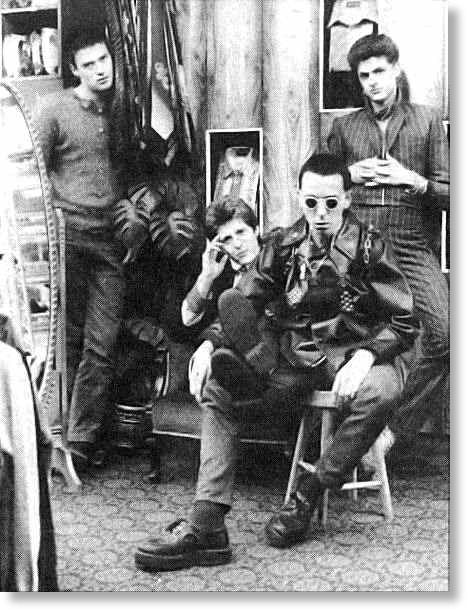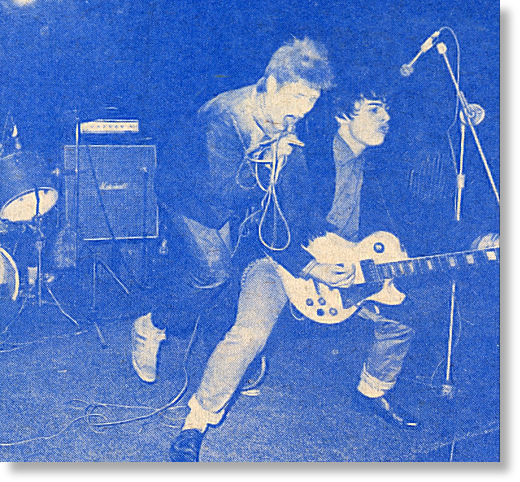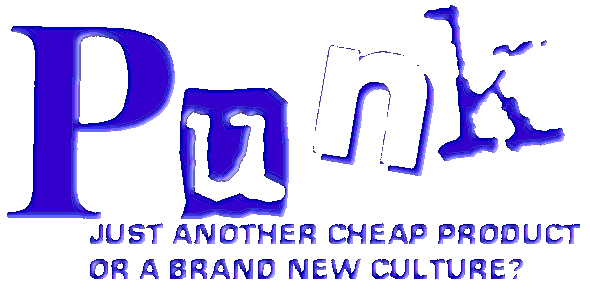
They mean it M-a-a-a-nchester
By PAUL MORLEY
MANCHESTER as a Rock and Roll town just didn't use to exist. It fed dutifully off
London, and there were frequent visits from groupS to the big halls; Free Trade, Belle Vue and Hard Rock.
Manchester had its place on the provincial touring lists alongside Birmingham, Newcastle, Liverpool, and
Glasgow, but towards the end of 1975 it looked like losing even that position among the the groovy out-of-town
venues.
There were a few low lit dives where bodies jerked moronically and automatically to what was at times termed
'progressive' and 'underground' rock; records churned out repeatedly and monotonously until it reached a stage
of spoon feeding. A few local bands performed proudly, regurgitating the same spoon-fed sounds. Some of them
smiled occasionally. I tell you, it was a very boring place to be - it had no identity, no common spirit or motive. It
was probably a reflection of the country at large.
Just as Manchester was about to fizzle out completely, Howard Devoto formed a group, Buzzcocks, and wrote the
words to a song "Boredom", "You know me I'm acting dumb, 'you know the scene, very hum-drum...
Boredom, ' boredom, boredom."
A year later, people smile, know each other, help each other, are part of each other. It's a recognisable
community. There are more venues, smaller and friendlier; the glorious Sunday nights at the Electric Circus,
Rasters, the late lamented Oaks and the Ranch Bar. A lot more minor groups visit and 90% of the time are eager
to return. Manchester is a great place to be now. There is grimness, determination, humour and awareness. The
scene has unfolded rather than-exploded but it's very much there and alive.
By PAUL MORLEY
MANCHESTER as a Rock and Roll town just didn't use to exist. It fed dutifully off
London, and there were frequent visits from groupS to the big halls; Free Trade, Belle Vue and Hard Rock.
Manchester had its place on the provincial touring lists alongside Birmingham, Newcastle, Liverpool, and
Glasgow, but towards the end of 1975 it looked like losing even that position among the the groovy out-of-town
venues.
There were a few low lit dives where bodies jerked moronically and automatically to what was at times termed
'progressive' and 'underground' rock; records churned out repeatedly and monotonously until it reached a stage
of spoon feeding. A few local bands performed proudly, regurgitating the same spoon-fed sounds. Some of them
smiled occasionally. I tell you, it was a very boring place to be - it had no identity, no common spirit or motive. It
was probably a reflection of the country at large.
Just as Manchester was about to fizzle out completely, Howard Devoto formed a group, Buzzcocks, and wrote the
words to a song "Boredom", "You know me I'm acting dumb, 'you know the scene, very hum-drum...
Boredom, ' boredom, boredom."
A year later, people smile, know each other, help each other, are part of each other. It's a recognisable
community. There are more venues, smaller and friendlier; the glorious Sunday nights at the Electric Circus,
Rasters, the late lamented Oaks and the Ranch Bar. A lot more minor groups visit and 90% of the time are eager
to return. Manchester is a great place to be now. There is grimness, determination, humour and awareness. The
scene has unfolded rather than-exploded but it's very much there and alive.

In the summer of '77
Manchester was rapidly
becoming the new
breeding ground for up
and coming British punk
bands. This scene
report done with a slight
bias written by fellow
Mancunian Paul Morley
was first published in
the New Musical
Express on July 30th
1977 and offers a brief
but interesting snapshot
into the citys prototype
punk scene.
Manchester was rapidly
becoming the new
breeding ground for up
and coming British punk
bands. This scene
report done with a slight
bias written by fellow
Mancunian Paul Morley
was first published in
the New Musical
Express on July 30th
1977 and offers a brief
but interesting snapshot
into the citys prototype
punk scene.
HOWARD DEVOTO is not acting dumb anymore. The scene isn't humdrum anymore. Certainly not in the Devoto
vicinity. He resides comfortably among his favourite homely artefacts in a place called Lower Broughton, and
spends his tIme answering the phone, taming weasels under the cocktail cabinet, and smiling at the
quasi-Brechtian get-up-and-go influences in a great deal of what is quantly termed 'new wave rock'.
Lower Broughton lies messily with plenty of those red-brick, cracked-window location's popular in mid-sixties pop
snaps, just outside Manchester. And right now Manchester is the centre for a happening, menacing, attitude-rich
movement that - to use an easy and no doubt misplaced equation - rivals the mythical creative flush of '60's
Liverpool in its fun, potential, and importance.
Things are happening in Manchester. Devoto knows, quietly. Devoto is important, quietly. Unique; a stupid word,
but in this case true.
Devoto used to be the singer and lyricist for Buzzcocks, Manchester's first new wave band, but he discovered that
he is perhaps more a dramatist than a performer. Typifying his skilful, almost absurdist dialogue technique with
lyrics is "Boredom", surely a genuine classic. The song is a curious assimilation of the central force behind
Samuel Beckett's play Waiting For Godot, which, equally curiously, relates to the initial idealism of punk/new
wave; that the pattern is desperate and yet the movement paradoxically hopeful.
Devoto left Buzzcocks six months back, one of the reasons being a cleverly masked reluctance to perform on
stage. He's still searching for a comfortable way to perform his work. His importance, and that of Buzzcocks,
cannot be overlooked in terms of Manchester's growth to what it is now; a pretty hot place to be.
For a start, it was Devoto who first brought the Sex Pistols up to Manchester - twice - thus establishing an early
reputation that Manchester was a good place for punk bands to play. This was back in June '76. Devoto realised
the importance of the Pistols from early on; "The Pistols certainly helped lead the way for me. Some of our songs
had been around not quite formulated for a few months before I saw them play. I'm not very good at envisaging
finished musical product. I knew what I wanted to say but I couldn't see how.
The Pistols made me realise how I could express what I was trying to say."
The Pistols were the final influential ingredient in a strange creative stew. Devoto already knew that the music
should be fast" ... The Stooges, obviously. It was so simple almost anyone could play it, but it was effective. That
was what I wanted."
Devoto is an individualist, more in love with
vitality and vigour of personality than morality. He
has more control of language than any of his
Immediate contemporaries and more complexity.
This was another factor in his quitting Buzzcocks:
a frustration that fans and critics alike tended to
overlook the subtleties of his presentation, ignore
the rich and lIvely language of the songs.
"I formed Buzzcocks" - a pop group whatever
else - "because I wanted to get across what I
was saying In the market place, not in a small
offIce in a tower block. People, I wanted people
to hear."
That people largely missed in performance the
intense overlay of repetition in "Boredom"; the
vain and humilihating urgency of desire in
"Time's Up"; the sharp fusion of terror and habit
in "Breakdown"; and the odd surrealistic vitality
of "Friends of Mine" (all tracks off their "Spiral
Scratch" e.p.) is, to understate, unfortunate.
vicinity. He resides comfortably among his favourite homely artefacts in a place called Lower Broughton, and
spends his tIme answering the phone, taming weasels under the cocktail cabinet, and smiling at the
quasi-Brechtian get-up-and-go influences in a great deal of what is quantly termed 'new wave rock'.
Lower Broughton lies messily with plenty of those red-brick, cracked-window location's popular in mid-sixties pop
snaps, just outside Manchester. And right now Manchester is the centre for a happening, menacing, attitude-rich
movement that - to use an easy and no doubt misplaced equation - rivals the mythical creative flush of '60's
Liverpool in its fun, potential, and importance.
Things are happening in Manchester. Devoto knows, quietly. Devoto is important, quietly. Unique; a stupid word,
but in this case true.
Devoto used to be the singer and lyricist for Buzzcocks, Manchester's first new wave band, but he discovered that
he is perhaps more a dramatist than a performer. Typifying his skilful, almost absurdist dialogue technique with
lyrics is "Boredom", surely a genuine classic. The song is a curious assimilation of the central force behind
Samuel Beckett's play Waiting For Godot, which, equally curiously, relates to the initial idealism of punk/new
wave; that the pattern is desperate and yet the movement paradoxically hopeful.
Devoto left Buzzcocks six months back, one of the reasons being a cleverly masked reluctance to perform on
stage. He's still searching for a comfortable way to perform his work. His importance, and that of Buzzcocks,
cannot be overlooked in terms of Manchester's growth to what it is now; a pretty hot place to be.
For a start, it was Devoto who first brought the Sex Pistols up to Manchester - twice - thus establishing an early
reputation that Manchester was a good place for punk bands to play. This was back in June '76. Devoto realised
the importance of the Pistols from early on; "The Pistols certainly helped lead the way for me. Some of our songs
had been around not quite formulated for a few months before I saw them play. I'm not very good at envisaging
finished musical product. I knew what I wanted to say but I couldn't see how.
The Pistols made me realise how I could express what I was trying to say."
The Pistols were the final influential ingredient in a strange creative stew. Devoto already knew that the music
should be fast" ... The Stooges, obviously. It was so simple almost anyone could play it, but it was effective. That
was what I wanted."
Devoto is an individualist, more in love with
vitality and vigour of personality than morality. He
has more control of language than any of his
Immediate contemporaries and more complexity.
This was another factor in his quitting Buzzcocks:
a frustration that fans and critics alike tended to
overlook the subtleties of his presentation, ignore
the rich and lIvely language of the songs.
"I formed Buzzcocks" - a pop group whatever
else - "because I wanted to get across what I
was saying In the market place, not in a small
offIce in a tower block. People, I wanted people
to hear."
That people largely missed in performance the
intense overlay of repetition in "Boredom"; the
vain and humilihating urgency of desire in
"Time's Up"; the sharp fusion of terror and habit
in "Breakdown"; and the odd surrealistic vitality
of "Friends of Mine" (all tracks off their "Spiral
Scratch" e.p.) is, to understate, unfortunate.
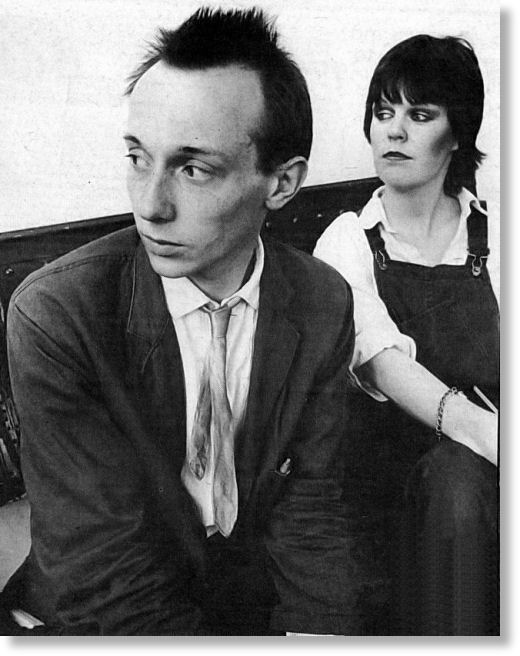
FOR THE first few months of what must loosely be termed 'The Movement', Buzzcocks evolved alongside The
Clash, The Damned, The Pistols and the rest to much the same universal misunderstanding and were the only
new Manchester rock band.
They played one of their first gigs at The Ranch in Manchester, the congregation centre for those with pins in
their sleeve, frustration (however mild or forced) in their heart, and action in their mind; much the same as the
lower level of the Roxy. "It was from here that we thought
that something would happen, that bands would form," says
Devoto. "A lot of what Buzzcocks tried to do in the early
days was inspire."
In fact, not a lot happened. Slaughter and the Dogs gradually
remodelled their ideals, and The Drones cautiously
materialised out of some hazy previous incarnation.
Little else.
At the end of '76 Manchester had two visits from the 'Anarchy'
tour, whIch undoubtedly intensified the city's reputation as a
place to play and insplred many more fans into the fold, so to
speak.
During 1976 Buzzcocks had led the way in Manchester,
showed what could be done. Early 1977 was when Devoto
bade farewell and "Spiral Scratch" was released.
Buzzcocks now gained Pete Shelley whose warmth and
sympathetic psychological acuteness is in direct contrast to
Devoto's mystery and invulnerability, and who contributes
Peter Pan vocals and off the wall guitar. Steve Diggle plays
furious elbow-tugging rhythm guitar, Garth is on courteous
bass and John Maher on almost technoflash drums.
Their abstract avant-garde style has set them way apart from
anyone else on the Manchester scene. Shelley's new songs
are propelled by genuine soclal and personal indignation, his
interpretalion of Devoto's work possibly the correct procedure
- a natural performer idiosyncratically delivering the songs of
a natural writer. There is something precious, special and
different about Buzzcocks that's still waiting to be exploited.
Howard Devoto, meanwhile, has not disappeared. No way.
His involvement with Buzzcocks still exists, via both management and New Hormones, the label which released
"Spiral Scratch", and which he co-owns with Richard Boon, Buzzcocks' manager. But it's as an artist that Devoto
can and should excel. Devoto is not a minor writer! As far as I can see he is not content to sit back and accept a
passive role. Like Samuel Beckett, who has surely influenced Devoto more than anyone or anything, his prominent
theme is the absurdity of existence.
Devoto is forming a group to play "fast and slow music", probably for record only. Wait.
Clash, The Damned, The Pistols and the rest to much the same universal misunderstanding and were the only
new Manchester rock band.
They played one of their first gigs at The Ranch in Manchester, the congregation centre for those with pins in
their sleeve, frustration (however mild or forced) in their heart, and action in their mind; much the same as the
lower level of the Roxy. "It was from here that we thought
that something would happen, that bands would form," says
Devoto. "A lot of what Buzzcocks tried to do in the early
days was inspire."
In fact, not a lot happened. Slaughter and the Dogs gradually
remodelled their ideals, and The Drones cautiously
materialised out of some hazy previous incarnation.
Little else.
At the end of '76 Manchester had two visits from the 'Anarchy'
tour, whIch undoubtedly intensified the city's reputation as a
place to play and insplred many more fans into the fold, so to
speak.
During 1976 Buzzcocks had led the way in Manchester,
showed what could be done. Early 1977 was when Devoto
bade farewell and "Spiral Scratch" was released.
Buzzcocks now gained Pete Shelley whose warmth and
sympathetic psychological acuteness is in direct contrast to
Devoto's mystery and invulnerability, and who contributes
Peter Pan vocals and off the wall guitar. Steve Diggle plays
furious elbow-tugging rhythm guitar, Garth is on courteous
bass and John Maher on almost technoflash drums.
Their abstract avant-garde style has set them way apart from
anyone else on the Manchester scene. Shelley's new songs
are propelled by genuine soclal and personal indignation, his
interpretalion of Devoto's work possibly the correct procedure
- a natural performer idiosyncratically delivering the songs of
a natural writer. There is something precious, special and
different about Buzzcocks that's still waiting to be exploited.
Howard Devoto, meanwhile, has not disappeared. No way.
His involvement with Buzzcocks still exists, via both management and New Hormones, the label which released
"Spiral Scratch", and which he co-owns with Richard Boon, Buzzcocks' manager. But it's as an artist that Devoto
can and should excel. Devoto is not a minor writer! As far as I can see he is not content to sit back and accept a
passive role. Like Samuel Beckett, who has surely influenced Devoto more than anyone or anything, his prominent
theme is the absurdity of existence.
Devoto is forming a group to play "fast and slow music", probably for record only. Wait.
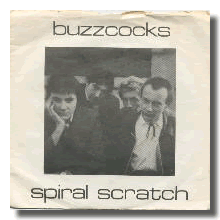
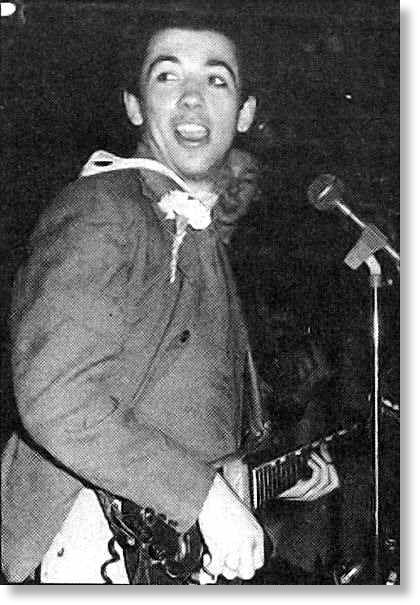
FROM-HIGH brow to glorious low brow pop
music and Manchester's two top shots for the
huge gap only Eater and the Hot Rods ever looked
like filling; Fast Pop. The Drones and Slaughter
and the Dogs are the groups in question, and if
Buzzcocks are by far and away number one, then
these two bands have worked admirably hard for
the number two spot in popularity.
It's been a good few months since I viewed the
lamentable debut gigs of both these bands, and
since then it's been intriguing and gratifying to see
them both sharpen their ideals, dragging their
previous faiths into new disciplines. Surely this is
the initial basis for what has sprouted into an
increasingly ugly monster - speed, aggression, beat
enthusiasm, a variable amount of ego fulfillment
plus frustration and that essential anti-apathy
ingredient.
The differences between the two bands date from
previous incarnations - the Dogs very much Bowie-
Ronson/Reed, The Drones a wishful attempt to
supply the missing link between Quo and Iggy.
Probably both would still be turning out the same
thing if not for The Ramones, Rotten and Strummer.
And that's the point; their songs are now faster, tighter
and sharper and more exciting. Both bands are
unrecognisable compared totheir beginnings, and that's
the way it - should be. Both have commercial possibilities
and neither mind a little manipulation as long as they're
stars and get to sign a few autographs. There was some
talk a while back of them doing a tour together, which
would have been a whammer if not for conflicting
personalities (aah .. healthy rivalry) and difficulties about
who would go on first (it would've had to be a sharing
arrangement!).
The development of the Dogs has a slightly perverse
quality about it. At the beginning their hammy theatrics
detracted from whatever quality their flashy glam rock
had, but gradually the frills were dropped and they
concentrated emphatically on sheer musical impact.
Playing with The Damned in London at the end of last
year they were a shameless bubble-gum rock band,
thrashing out with enthusiastic abandon rough, cute,
speeded-up "Suffragette-City/ Queen Bitch/Sweet Jane"
variations that couldn't but fail to delight.
They played it refreshingly straight visually, which was
thought by many to be a hindrance. Playing with the
Damned didn't help, and these days The Dogs are
visually just plain silly. Lead singer Wayne Barratt covers
himself in talcum powder, which once was a neat idea,
and guitarist Mike Rossi, who knows all the right moves,
mercilessly crams them down the audience's throat. Visually they impose when they don't need to; their music
does it all for them. Simply, the band seem to have become sloppy, appear reluctant to continue the shrewd
sharpening of their approach and, since the beginning of the year have become static.
But who can deny that they've a great future? I want to see them on T.O.T.P. It's their natural habitat.
The Drones' natural habitat is the stage. At times they echo the thrill and thrash of Quo at full throttle, but their
songs are too short and well constructed for any monotony to set in. They have no great songs but a series of
up-front sharp moves that aim purely for the body and the feet.
Their improvement since the early days is marked. The difference between, say, the early version of "Hard On
Me" (a track off their new e.p. "Temptations of a White Collar Worker") and the new version like the difference
between Kiss and The Ramones, On stage they refuse to let up, and although it's difficult to see in which direction
they're are fine entertainers and definitely for you if Led Zep flipped you until the Damned swayed you.
CONTINUES....
Part Two
music and Manchester's two top shots for the
huge gap only Eater and the Hot Rods ever looked
like filling; Fast Pop. The Drones and Slaughter
and the Dogs are the groups in question, and if
Buzzcocks are by far and away number one, then
these two bands have worked admirably hard for
the number two spot in popularity.
It's been a good few months since I viewed the
lamentable debut gigs of both these bands, and
since then it's been intriguing and gratifying to see
them both sharpen their ideals, dragging their
previous faiths into new disciplines. Surely this is
the initial basis for what has sprouted into an
increasingly ugly monster - speed, aggression, beat
enthusiasm, a variable amount of ego fulfillment
plus frustration and that essential anti-apathy
ingredient.
The differences between the two bands date from
previous incarnations - the Dogs very much Bowie-
Ronson/Reed, The Drones a wishful attempt to
supply the missing link between Quo and Iggy.
Probably both would still be turning out the same
thing if not for The Ramones, Rotten and Strummer.
And that's the point; their songs are now faster, tighter
and sharper and more exciting. Both bands are
unrecognisable compared totheir beginnings, and that's
the way it - should be. Both have commercial possibilities
and neither mind a little manipulation as long as they're
stars and get to sign a few autographs. There was some
talk a while back of them doing a tour together, which
would have been a whammer if not for conflicting
personalities (aah .. healthy rivalry) and difficulties about
who would go on first (it would've had to be a sharing
arrangement!).
The development of the Dogs has a slightly perverse
quality about it. At the beginning their hammy theatrics
detracted from whatever quality their flashy glam rock
had, but gradually the frills were dropped and they
concentrated emphatically on sheer musical impact.
Playing with The Damned in London at the end of last
year they were a shameless bubble-gum rock band,
thrashing out with enthusiastic abandon rough, cute,
speeded-up "Suffragette-City/ Queen Bitch/Sweet Jane"
variations that couldn't but fail to delight.
They played it refreshingly straight visually, which was
thought by many to be a hindrance. Playing with the
Damned didn't help, and these days The Dogs are
visually just plain silly. Lead singer Wayne Barratt covers
himself in talcum powder, which once was a neat idea,
and guitarist Mike Rossi, who knows all the right moves,
mercilessly crams them down the audience's throat. Visually they impose when they don't need to; their music
does it all for them. Simply, the band seem to have become sloppy, appear reluctant to continue the shrewd
sharpening of their approach and, since the beginning of the year have become static.
But who can deny that they've a great future? I want to see them on T.O.T.P. It's their natural habitat.
The Drones' natural habitat is the stage. At times they echo the thrill and thrash of Quo at full throttle, but their
songs are too short and well constructed for any monotony to set in. They have no great songs but a series of
up-front sharp moves that aim purely for the body and the feet.
Their improvement since the early days is marked. The difference between, say, the early version of "Hard On
Me" (a track off their new e.p. "Temptations of a White Collar Worker") and the new version like the difference
between Kiss and The Ramones, On stage they refuse to let up, and although it's difficult to see in which direction
they're are fine entertainers and definitely for you if Led Zep flipped you until the Damned swayed you.
CONTINUES....
Part Two
